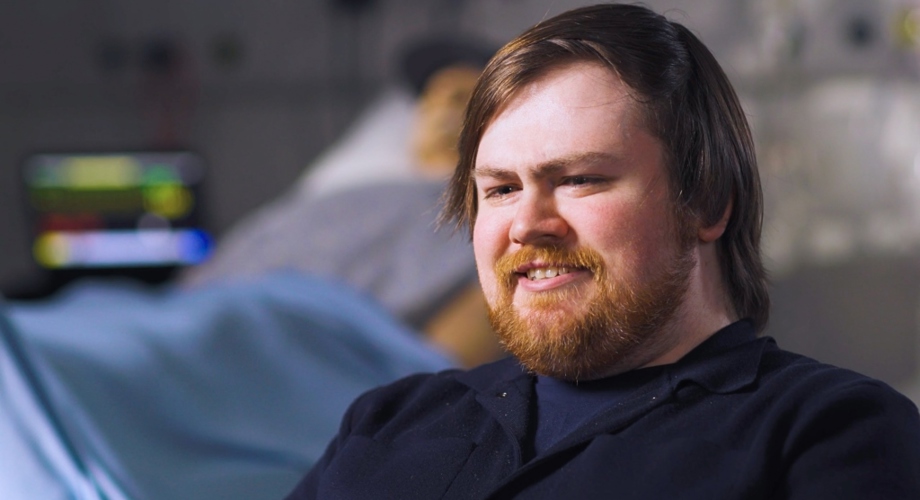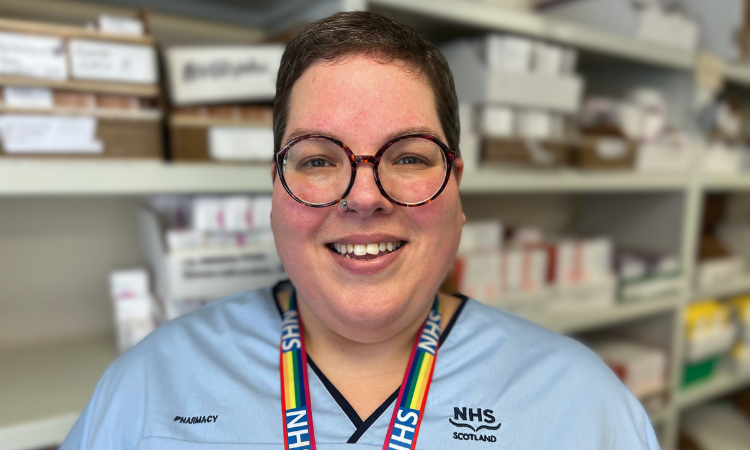
NHSScotland Careers
04 October 2024
•4 min read

What is a simulation technician?
Simulation technicians support the delivery of training to students and healthcare professionals. In the SCSCHF, this includes learners from the NHS, universities, and other sectors and industries.
Jamie sets up high-fidelity training rooms and equipment, including patient simulators, advanced life support manikins, ECG monitors, and anaesthetic machines. Participants use the simulation equipment in various real-life scenarios to learn procedures and practice clinical skills.
The equipment must be prepared and in working order, as several training sessions can be scheduled daily. Jamie manages the centre’s stock inventory and cleans and maintains equipment so it is ready for use.
Jamie provides technical support and equipment demonstrations to course facilitators and learners during simulations. He often participates in scenarios, acting as a healthcare professional or a patient. Jamie also helps to design new simulation courses and support school placements within the centre.
Jamie's story
Jamie is a simulation technician at the Scottish Centre for Simulation and Clinical Human Factors (SCSCHF) in NHS Forth Valley. It’s a state-of-the-art multi-professional training and education facility.
In this video, Jamie describes a typical day at work.
How I became a simulation technician
Before applying for a Business Administration Modern Apprenticeship at NHS Forth Valley, I didn’t know what I wanted to do. I knew that the opportunities and job security in the NHS were better than with other employers. With so many positives, I thought that working in the NHS was something I’d like to do and be part of.
I started the Modern Apprenticeship programme in December 2016. Just as I was completing it, I applied for a simulation technician role. Although very different from my last job, it has proved to be a fantastic opportunity to work in simulation-based medical education.
I’d never heard of my job before, but I’m interested in AV and IT, and I’ve always loved acting. I saw it as a chance to be part of something important. In this role, I can combine all my skills, knowledge, and interests to support the centre in delivering high-quality training.
A typical day at work
When I come to work, I make sure everything is switched on and that the simulation centre is up and running. After that, I might be required to participate in a scenario, generally as an embedded healthcare professional. My role is to guide the training session and support the facilitator and the trainees.
Simulation training is a technique for creating a safe learning environment where learners experience different real-life clinical scenarios. Some of these might be rare but are time-critical. It allows them to practice clinical skills and procedures before they see patients, and it helps save lives.
I know what we want the participants to do to get the most out of each scenario. I provide subtle hints to help guide them so that they meet their learning objectives. In the post-session debrief, learners view a video of their training scenario. It helps them to reflect on what went well and what they might need more support with.
Supporting new colleagues
When new staff members join the centre, they can sometimes be nervous about participating in medical training scenarios. I offer support and training to help them. Seeing these colleagues develop in their roles and grow in confidence is very rewarding.
Simulation equipment
SimMan3G is our main manikin in the centre. It “breathes”, has a pulse, can blink, and has reactive pupils. We use the manikin in various simulation scenarios to provide an immersive experience for students and healthcare professionals.
We have many “part task trainers” that allow learners to practice specific skills such as central line insertion and chest drains. Using kit like this makes skills development much safer for trainees and their patients.
We also have a variety of medical equipment to assist in each scenario, such as:
- anaesthetic machines
- defibrillators
- syringe drivers
- patient monitors for monitoring vital signs
- hospital beds
- trolleys
- a variety of surgical equipment
My favourite piece of kit
My favourite piece of kit in the centre is the Lucas3 automated CPR device. It is a mechanical CPR device that maintains good quality CPR for extended periods. It means staff can be freed up when someone goes into cardiac arrest to provide advanced life support in a cardiac emergency.
Personal development opportunities
I’ve always been supported to do any training I feel is helpful for me in my role. My manager is a very supportive person. She helped me to find my feet when I first started in the centre.
The best part of my job
The best part of my job is seeing that moment when a light bulb switches on in someone’s head during a debrief. After watching a video of the session, they realise that they’ve not done something correctly or that they’ve done well.
Seeing that moment when they reflect on the scenario. Then, they realise that they did well or know what they need to work on. They leave the simulation centre feeling confident in their knowledge and skills, having participated in simulations of real-life clinical emergencies. It’s really rewarding.
This job is genuinely a pleasure. I see the difference I make in people's professional career journeys, and I can’t imagine doing anything else right now.
Outreach activities
I enjoy chatting with young people about career opportunities and education pathways in the NHS. The career information available is much better now than when I was a job seeker.
We occasionally take basic resuscitation manikins to schools and colleges for outreach simulations. The reaction is usually humorous, as everyone tends to find the manikins a little unusual.
The mobile skills unit (MSU) was used at the local college's careers event. This excellent resource allowed us to show young people what a working simulation space looks like and what it might be used for.
My advice for navigating your career path
There are lots of different career opportunities in the NHS, so I say go for it! You’ll find information on the NHSScotland Careers website and My World of Work. If you’re interested in an apprenticeship, check out apprenticeships.scot for job opportunities.
The NHS is precious, and it looks after us. I feel blessed to be able to support it. It’s also a great employer. I feel secure in my role, annual leave entitlement is excellent, and personal and professional development is supported. These are practical reasons to think about a career in the NHS. There is something for everyone. You just need to explore the right role for you.

Scotland’s skills generation
Scottish apprenticeships are fuelling Scotland’s skills generation, creating a skilled workforce for now and the future.
Find out how an apprenticeship can help you succeed in life and work.